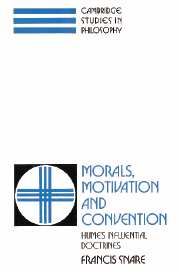Book contents
- Frontmatter
- Contents
- Acknowledgements
- NOTE
- Introduction
- Part I The argument for sentimentalism
- 1 A systematic ambiguity
- 2 The influence argument
- 3 Some bad reasons for believing the first premiss
- 4 The Humean theory of motivating reasons
- 5 The provocative Humean theory of motivation
- Part II The problems and consequences of sentimentalism
- Bibliography
- Index
4 - The Humean theory of motivating reasons
Published online by Cambridge University Press: 05 June 2012
- Frontmatter
- Contents
- Acknowledgements
- NOTE
- Introduction
- Part I The argument for sentimentalism
- 1 A systematic ambiguity
- 2 The influence argument
- 3 Some bad reasons for believing the first premiss
- 4 The Humean theory of motivating reasons
- 5 The provocative Humean theory of motivation
- Part II The problems and consequences of sentimentalism
- Bibliography
- Index
Summary
There could well be two theories about reasons for acting and preferring in Hume. One is a theory of motivating reasons. The other is a theory of justifying reasons. While they might be related in some way, they are not to be just confused outright. The former is a descriptive thesis about what further has to be involved beyond a belief if an agent is to have a motivating reason for acting (or preferring) where a motivating reason is one sort of thing that can sometimes help to explain an agent's acting (or preferring). The latter thesis is a normative thesis about what has to be involved if there is to exist a good reason for an agent to act (or prefer) in certain ways (whether or not the agent is aware of this or motivated by it) where a good reason is something that can justify an agent's acting (or preferring) in certain ways. In both cases, however, it is something like a passion, desire, want, pro-attitude, etc., which is said to be this further thing which has always to be involved.
In contemporary philosophy we can find both a Humean theory of motivating reasons and a Humean theory of justifying reasons, whether or not we can find both of these in Hume. The former clearly can be found in premiss (1) of the influence argument. However it is not quite so obvious that we can attribute the Humean theory of justifying reasons to Hume, although he may have lapsed into it in unguarded, rhetorical moments.
- Type
- Chapter
- Information
- Morals, Motivation, and ConventionHume's Influential Doctrines, pp. 84 - 107Publisher: Cambridge University PressPrint publication year: 1991

